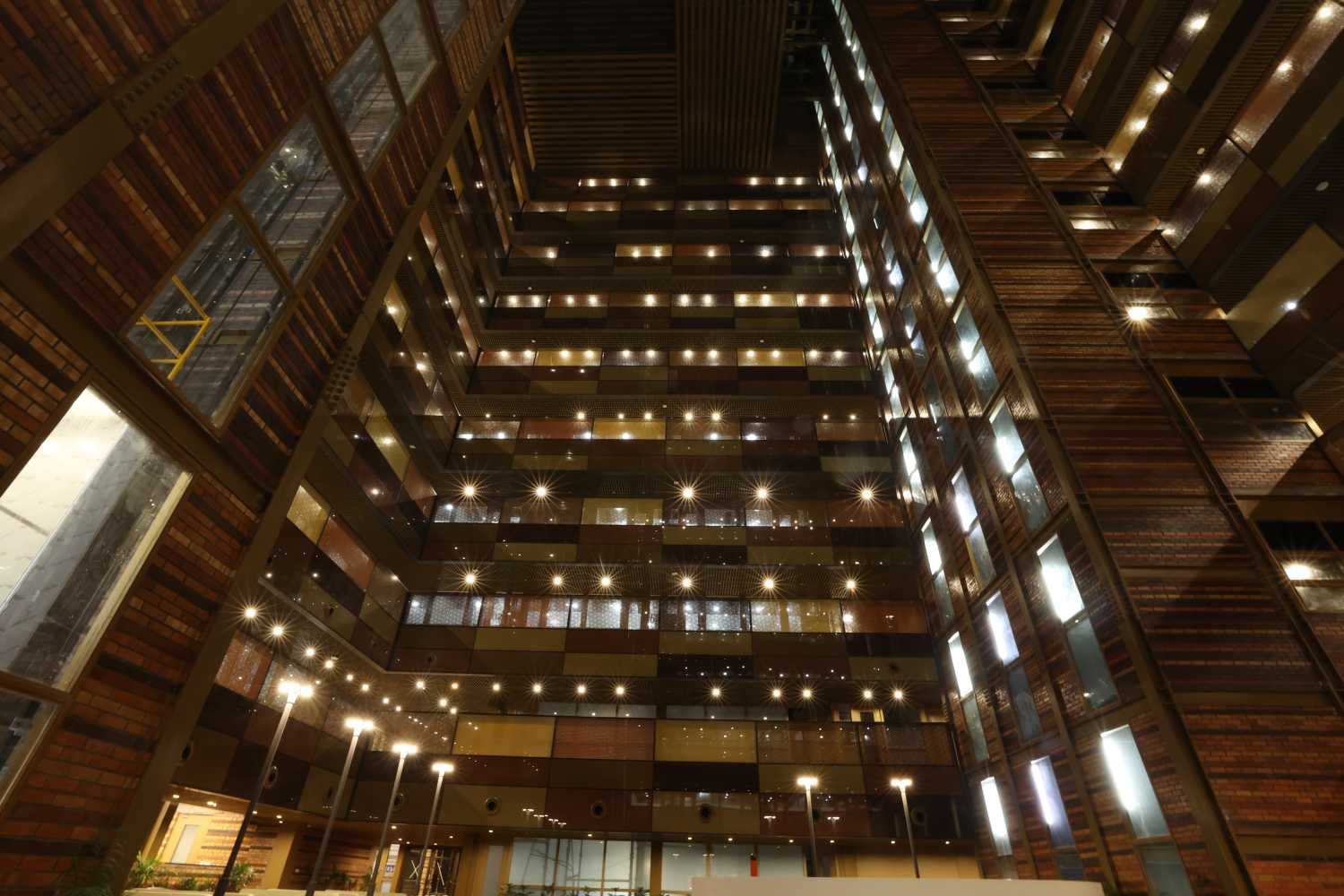

Located at the crossroads of South Asia and Central Asia, facing southwards from the Hindukush into the Indian sub-continent and looks down northwards into India’s extended neighbourhood.
Afghanistan’s political geography has left a deep imprint not only on the regional geo-political calculus but is also mirrored in its diverse and complex socio-cultural tapestry.
Traditionally the India has had deep civilizational links with Afghanistan. The change in political geography of the region with the 1947 partition notwithstanding, India has maintained good political relations with the Afghan state. The only aberration thus far being the period of Taliban rule (1996-2001). India’s engagement with the country was stepped up after 2001 with the aim of contributing to international efforts to bring peace, stability and eventually resuscitating the country as a bridge between South and Central Asia. However intensified political and diplomatic engagement has not translated into a deeper socio-anthropological understanding of Afghan society, essential to evolving a sound policy prognosis.
The Centre for Afghanistan Studies (CAS) through its research intends to provide a window into complex yet fascinating dynamics shaping socio-cultural, geo-political and economic landscape of Afghanistan. CAS would contribute to cutting edge, policy oriented research on Afghanistan and its implications for the region at large. It would also provide a platform for collaborative exchange programs and transmission of knowledge to students and scholars.
Mission
Objectives
Activities
1. Institutional networking
Collaborate with research and educational institutions in Afghanistan and Central Asia.
Promote active exchange of research scholars and students.
2. Research
Engage in trans-disciplinary research, drawing on, but not limited to fields of history, anthropology, sociology and political science.
Examine the impact of prolonged armed conflict on the social, cultural, political and geo-political landscape of Afghanistan.
Establish a first of its kind resource centre on Afghanistan in India in collaboration with the Afghanistan Centre at Kabul University.
3. Course(s) Offered
South and Central Asia: Key Issues and Perspectives
Dari Language
4. Outreach
Disseminate research findings in the academic and policy circles through organization conferences and research publications
CONTACT US
DR. RAGHAV SHARMA
Associate Professor, Assistant Dean (Academic Affairs) and Director, Centre for Afghanistan Studies
Mob : +91-8396907463
Email : raghav@jgu.edu.in
Charcha is a forum for discussion of and engagement with ideas. The blog has been conceptualised in keeping with the vision of CAS of a commitment to an exchange of knowledge and ideas across societies and disciplines. We encourage young researchers, students and academics to offer contributions analysing recent developments in Afghanistan and the region. Contributions are encouraged on, but not limited to:
We accept contributions on three languages:
Blog posts are broadly expected to adhere to the following guidelines:
All blog posts must be submitted to the Editor via email (raghav@jgu.edu.in). The editorial team would require 5-7 working days to review your blog post prior to publication. Please feel free to get in touch with our editorial team to share and/ or discuss ideas/ topics that you may be interested to publish on. Please note all blog posts would be subject to an editing process which may include suggestions for additions, deletions or revisions.
Blog Posts
Islamic Radicalization in Pakistan with Captain (Dr.) Alok Bansal
Project on School Education in Faryab, Afghanistan
This is a short term, third party project being executed in collaboration with Integrity Watch Afghanistan (IWA)(https://iwaweb.org ). The project aims to critically and comparatively evaluate the sustainability of educational facilities set up by Norway and Department of Defence, USA respectively across ten different provinces of Afghanistan. Key findings of the project have been compiled in the form of a report published by IWA. For a copy of the report’s full findings : (Click here).
Khanabadosh: Experiences and Implications of Afghan Refugee in India
CAS has been awarded a grant by the Research Committee of Jindal Global University (JGU) to execute a project on Afghan refugees in India.The foremost concern of this research will be to critically engage with the experiences of conflict displaced Afghan population in India living as non-camp refugees. The foremost concern of this research would be to engage with the question of what are the key drivers propelling Afghans to migrate to India in larger numbers? Second why does India lack a structured legal regime for refugee protection? An engagement with this question would also entail examining differing approaches adopted by the Government of India to different communities coming to the country in search of refuge. An engagement of such nature assumes significance in light of continued inflow of displaced populations into India, in addition to Internally Displaced Populations (IDP’s) within India.
RESEARCH ASSOCIATES
Himabindu Karibhuktha
Associate
Himabindu Karibhuktha is an undergraduate student at Jindal School of International Affairs in O. P. Jindal Global University, Haryana. She had previously interned at the Centre for Afghanistan Studies (CAS) and is currently as Research Assistant at Centre for Latin American, African and Caribbean Studies (CALACS) at JGU. Her research interests lie in Development, South-South Cooperation, Humanitarian assistance and Refugee laws in India.
Shukriya Yari
Research Associate
Shukria Yari is from Afghanistan. She has done her schooling from Rabia Balkhi High School in Kabul Afghanistan and after that, she relocated to India four years ago. She is currently a final year student in the Jindal School of International Affairs at O.P Jindal Global University. Her areas of interests include Refugee studies and Development in APAC Region and she has been working as a researcher in these fields. After doing her bachelors in International Affairs, she wishes to pursue her Master’s in the field of International Relations. In the future, she aims to work on public issues that challenge global and national inequalities and contribute towards shaping a more inclusive world.
The Centre for Afghanistan Studies is committed to its vision on the joint production and dissemination of knowledge on Afghanistan through conducting joint research, webinars, exchange of students and faculty. CAS has thus sought to actively forge partnerships with a diverse set of educational and research institutions in Afghanistan. Below is a list of our partners in Afghanistan:
Centre for Afghanistan Studies Internship Guidelines
Centre for Afghanistan Studies (CAS) provides internship opportunities for all students of JGU who preferably have a background in–but not limited to–history, sociology, political science, international relations and public policy. This is a voluntary internship that enables students to get practical experiences through variety of activities. CAS accepts applications for internships on a rolling basis for a minimum period of eight weeks. The intern will work closely with the CAS management team to assist in the centre’s activities.
Roles & Responsibilities
Assist in preparing information and research materials
Assist in administrative duties of the centre
Organize centre’s events i.e. movie screenings, trainings, workshops, conferences etc.
Regularly update centre’s website content
Engage audience through regular posts on the centre’s social media platform
Publicize centre’s blog among students
Contribute a minimum of two articles or one research paper to the centre’s blog
Assist in conducting research projects
Any other activity assigned by the team
Criteria & Qualifications
Full time student enrolled in the under–graduate or Postgraduate program at JGU
Proficient computer skills
Excellent command of English language
Dari and Pashto language skills are preferred
Excellent communication skills
Ability to work individually and as a team player
Ability to execute assigned tasks in given deadlines
Please note interns are not offered any remuneration. Your application must be accompanied by a detailed CV; a one-page cover letter stating why you wish to intern with the centre; and one short writing sample of 800 words. Interested candidates may send in their applications to raghav@jgu.edu.in or bdaud@jgu.edu.in. to raghav@jgu.edu.in
Think Tanks and Centres:
Media:
Journal:
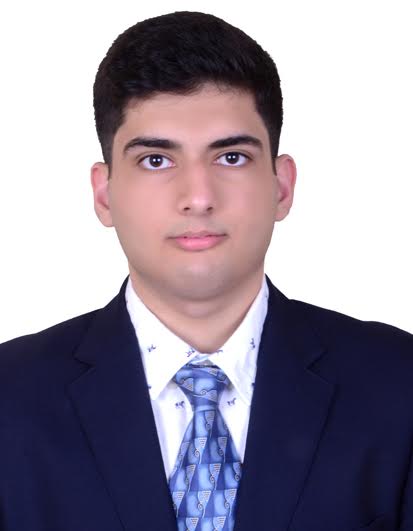 |
Aadityavikram RanaAadityavikram is a second-year student, currently pursuing a B.A. in Global Affairs. He possesses a keen research interest in the different cultures and history around the world. He wishes to explore the possibilities of creating platforms that facilitate a convergence between historical world and contemporary world through International relations. He is keen about storing unheard stories in history that reflect upon the current international affairs world-wide. |
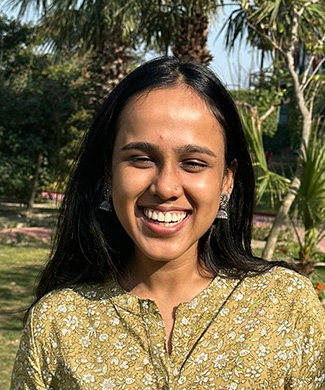 |
Harnoor KaurI am Harnoor Kaur Uppal from Guwahati, Assam. I am currently in my first year pursuing B.A. (Hons.) in Global Affairs at O.P. Jindal Global University. Apart from my academic pursuits, I have actively engaged in studying International Relations through the lens of a dynamic socio-cultural environment. Passionate about theatre, I am fortunate to pursue my passion with the help of Centre of Afghanistan Studies. My interest lies in highlighting the cultural diaspora of important locations pertinent to IR through a medium of art that I am skilled at, theatre. |
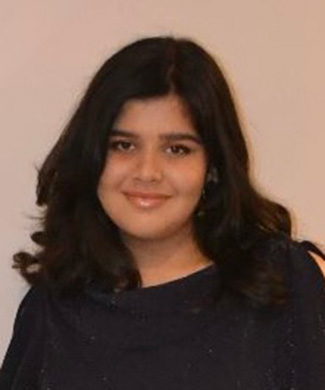 |
Vasatika SaraswatVasatika Saraswat is a first year BA.LLB law student at Jindal Global Law School (JGLS). She exhibits a profound and unremitting interest in delving deep into the complexities and nuances of intersectionality, feminism, gender, sexuality, transnational humanitarian law, and international relations. At the Centre of Afghanistan Studies, she aims to delve deeper into the intricate and distinctive geopolitics and cultural nuances of Afghanistan. |
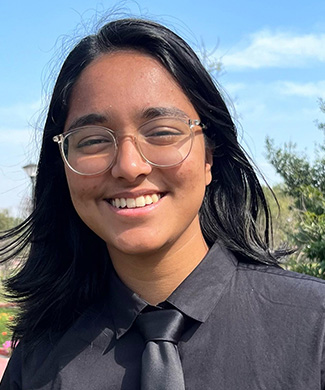 |
Mansi ChhadiaMansi Chhadia is a first-year student, currently pursuing a B.A. in Global Affairs. She possesses a keen research interest in the socio-cultural developments of seminal communities, including those often overlooked in the conventional global discourse. |
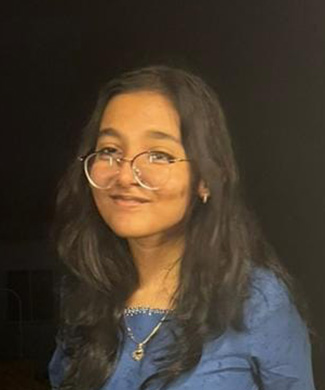 |
Muskan HossainHello! My name is Muskan Hossain and I’m a first-year student at OP Jindal Global University pursuing BA (Hons.) Liberal Arts and Humanities. I’ve been an avid reader for as long as I can remember and some of my favorites include “The God of Small Things” by Arundhati Roy, “A Thousand Splendid Suns” by Khaled Hosseini and “A Time to Kill” by John Grisham. My main passion is to use my interest in writing, to help people around the world and become the voices of the people who face injustice and discrimination so that I can raise awareness for them and help make change. |
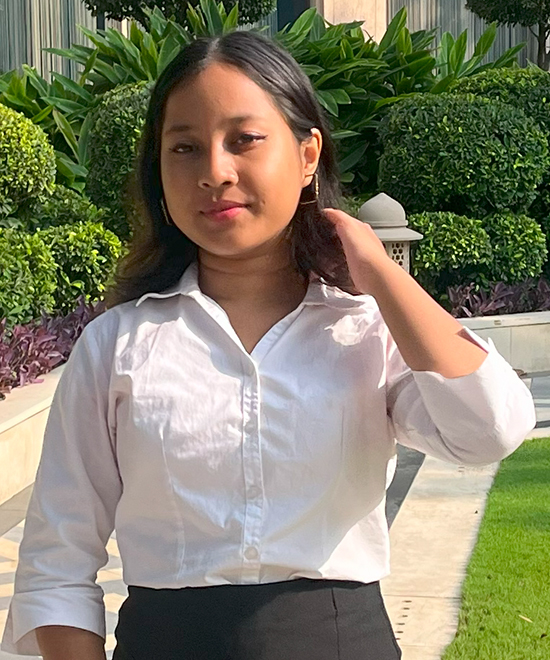 |
OditiOditi, can be best described as a passionate individual who tries to foster collaborative environment when it comes to work. She is currently in her 2nd year pursuing Global Affairs. Additionally, she’s a very stage friendly person who can be seen hosting events and dancing as she is also a classically trained Bharatnatyam dancer. |
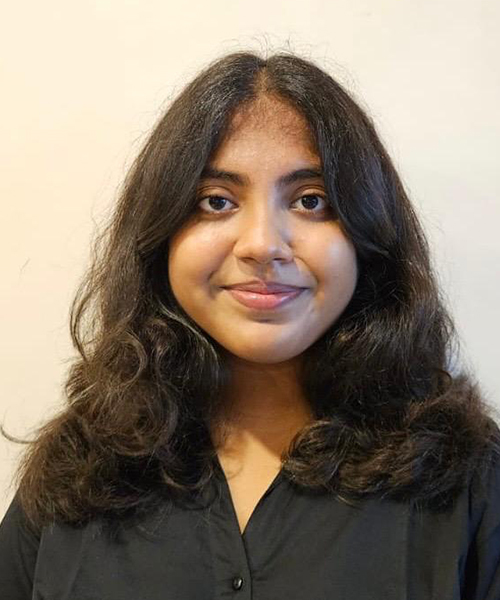 |
Tanishi RanjanTanishi Ranjan is a second-year BBA LLB student at Jindal Global Law School, driven by a deep passion for reading and research. With a keen interest in learning about social issues, feminism and global affairs, she is committed to acquiring knowledge that can bring about meaningful change. Believing that knowledge is never wasted, she is eager to explore and understand the complexities of the world through her academic pursuits and aims to contribute thoughtfully to discussions on justice and equality. |
 |
AnushkaI am a fifth year BA.LLB. student at Jindal Global Law School. I have a profound interest in human rights law and its interplay with the culture of marginalized communities, often shadowed by a painful history. Such an interest was developed through the works of writers like Khaled Hosseini and artists alike. At the Centre of Afghanistan Studies, I aims to delve deeper into the intricate and distinctive geopolitics and the impact on the cultural nuances of Afghanistan. |
 |
Kalyani JanakiramanKalyani Janakiraman is a first-year M.A. Diplomacy, Law, and Business (DLB) student with a diverse academic background in political science and economics, and a passion for mathematics. Her research interests focus on West Asia, postcolonial international relations, and the role of geography in conflicts. With a deep understanding of the socio-political dynamics in the region, Kalyani is keen on contributing to policy-oriented research that explores Afghanistan’s complex socio-cultural and geopolitical landscape. She aims to engage with the Centre’s mission to foster collaborative research and knowledge exchange, contributing to a nuanced understanding of Afghanistan’s role in regional geopolitics. She loves playing chess, pool and reading in her free time. |
 |
Nishtha SadhooMy name is Nishtha Sadhoo, and I am a law graduate currently pursuing a Masters in Diplomacy, Law and Business. My tryst with Afghanistan started with the popular story ‘Kabuliwala’, which introduced me to Afghanistan’s rich cultural tapestry. As I’ve followed the region’s recent political and social shifts, my interests have expanded into studying its geopolitical stability and socio-economic complexities. I am dedicated to exploring how Afghanistan’s strategic location and its complex ethnic and political makeup intersect with global power dynamics, and examining the resultant impact on both regional stability and international relations. |
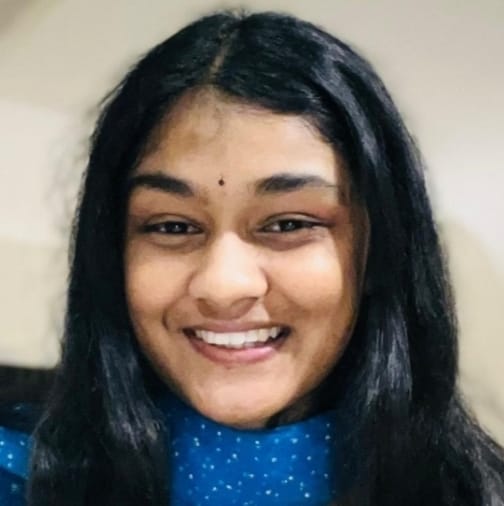 |
Aastha SaxenaI’m Aastha Saxena, currently pursuing a B.Com LLB at Jindal Global Law School, where I’m enrolled in a five-year course. My law-related experiences include internships focused on Intellectual Property Rights (IPR) and working with an NGO. I also serve as an editorial assistant at the Centre for Neurodiversity Studies and contribute as a podcast researcher at the Centre for Afghanistan Studies. Beyond academics, I am passionate about swimming and skating. |
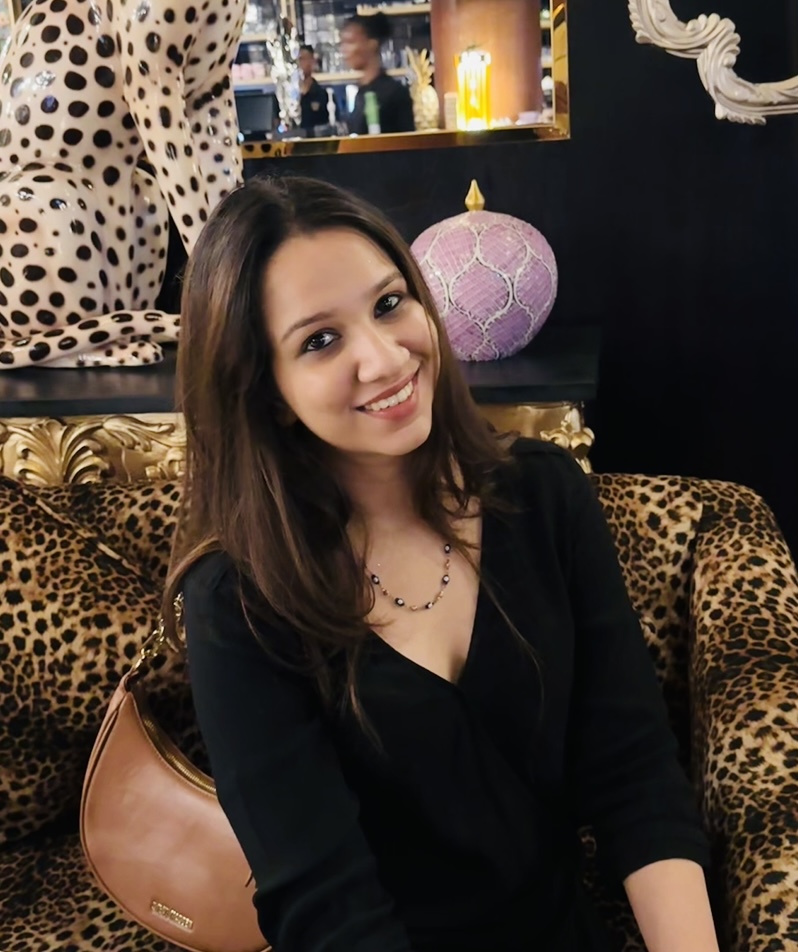
|
Hrishita NandMy name is Hrishita Nand. I am currently pursuing BA (Global Affairs) from Op Jindal Global University. I have an experience in research and aim to pursue the same in the future. While being a diligent worker, I would also like to mention that I am extremely particular with my projects. I aspire to give my all into everything I do. I ensure you that I would be a great addition to the CAS team and contribute significantly to the growth of my peers as well as the organization. |